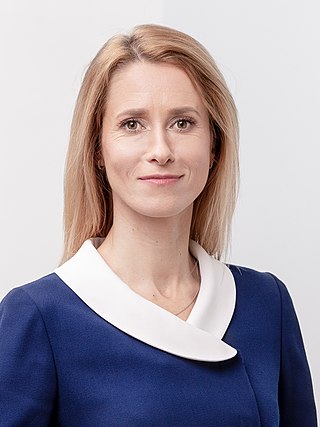Related Research Articles
The Republic of Estonia gained its independence from the Russian Empire on 24 February 1918 and established diplomatic relations with many countries via membership of the League of Nations. The forcible incorporation of Estonia into the Soviet Union in 1940 was not generally recognised by the international community and the Estonian diplomatic service continued to operate in some countries. Following the restoration of independence from the Soviet Union, Russia was one of the first nations to re-recognize Estonia's independence. Estonia's immediate priority after regaining its independence was the withdrawal of Russian forces from Estonian territory. In August 1994, this was completed. However, relations with Moscow have remained strained primarily because Russia decided not to ratify the border treaty it had signed with Estonia in 1999.

Tallinn is the most populous and capital city of Estonia. Situated on a bay in north Estonia, on the shore of the Gulf of Finland of the Baltic Sea, Tallinn has a population of 437,811 and administratively lies in the Harju maakond (county). Tallinn is the main financial, industrial, and cultural centre of Estonia. It is located 187 km (116 mi) northwest of the country's second largest city Tartu, however only 80 km (50 mi) south of Helsinki, Finland, also 320 km (200 mi) west of Saint Petersburg, Russia, 300 km (190 mi) north of Riga, Latvia, and 380 km (240 mi) east of Stockholm, Sweden. From the 13th century until the first half of the 20th century, Tallinn was known in most of the world by variants of its other historical name Reval.

Baltic Germans were ethnic German inhabitants of the eastern shores of the Baltic Sea, in what today are Estonia and Latvia. Since their coerced resettlement in 1939, Baltic Germans have markedly declined as a geographically determined ethnic group. However, it is estimated that several thousand people with some form of (Baltic) German identity still reside in Latvia and Estonia.

The northern region of Europe has several definitions. A restrictive definition may describe Northern Europe as being roughly north of the southern coast of the Baltic Sea, which is about 54°N, or may be based on other geographical factors such as climate and ecology.

The Baltic states or the Baltic countries is a geopolitical term, which currently is used to group three countries: Estonia, Latvia, and Lithuania. All three countries are members of NATO, the European Union, the Eurozone, and the OECD. The three sovereign states on the eastern coast of the Baltic Sea are sometimes referred to as the "Baltic nations", less often and in historical circumstances also as the "Baltic republics", the "Baltic lands", or simply the Baltics.

Estonians or Estonian people are a Finnic ethnic group native to Estonia who speak the Estonian language.
The recorded history of music in Estonia dates back as far as the 12th century.

MS Estonia was a cruiseferry built in 1980 for the Finnish company Rederi Ab Sally by Meyer Werft, in Papenburg West Germany. She was employed on ferry routes between Finland and Sweden by various companies until 1993, when she was sold to Nordström & Thulin for use on Estline's Tallinn–Stockholm route. The ship's sinking on 28 September 1994, in the Baltic Sea between Sweden, Finland and Estonia, was one of the worst peacetime maritime disasters of the 20th century, claiming 852 lives.

The prime minister of Estonia is the head of government of the Republic of Estonia. The prime minister is nominated by the president after appropriate consultations with the parliamentary factions and confirmed by the parliament (Riigikogu). In case of disagreement, the Parliament can reject the president's nomination and choose their own candidate. In practice, since the prime minister must maintain the confidence of Parliament in order to remain in office, they are usually the leader of the senior partner in the governing coalition. The current prime minister is Kaja Kallas of the Reform Party. She took the office on 26 January 2021 following the resignation of Jüri Ratas.

Populated places in Estonia, are cities or settlement units of rural municipalities, but only cities have administrative functions. Settlement units are divided into settlements and urban regions.

The Estonian Wikipedia is the Estonian version of Wikipedia, the free encyclopedia, started on 24 August 2002. As of February 2023, the edition has about 234,000 articles.

Estonia first competed as a nation at the 1920 Summer Olympics, two years after the country declared independence from the then warring Russian and German Empires in 1918. The Estonian National Olympic Committee was established in 1923. The first Winter Olympics for independent Estonia were the 1928 Winter Olympics. Estonian athletes took part in the Olympic Games until the country was invaded and occupied by the Soviet Union in 1940. The 1980 Summer Olympics sailing regatta was held in Tallinn, Soviet-occupied Estonia. Since the end of the Soviet occupation in 1991, Estonia has participated in all Olympics. Estonia has won most of its medals in wrestling (11), weightlifting (7), cross-country skiing (7) and athletics (6).

Estonia, formally the Republic of Estonia, is a country by the Baltic Sea in Northern Europe. It is bordered to the north by the Gulf of Finland across from Finland, to the west by the sea across from Sweden, to the south by Latvia, and to the east by Lake Peipus and Russia. The territory of Estonia consists of the mainland, the larger islands of Saaremaa and Hiiumaa, and over 2,200 other islands and islets on the eastern coast of the Baltic Sea, covering a total area of 45,339 square kilometres (17,505 sq mi). The capital city Tallinn and Tartu are the two largest urban areas of the country. The Estonian language is the autochthonous and the official language of Estonia; it is the first language of the majority of its population, as well as the world's second most spoken Finnic language.
This is a list of the Estonia national football team results from 2010 to 2019.
A list of films produced in Estonia ordered by year of release. For an alphabetical list of Estonian films, see Category:Estonian films
This is a list of the Estonia national football team results from 1991 to 2009.
References
- ↑ "Pärnu Keskraamatukogu: Opening hours". www.pkr.ee. Retrieved 26 March 2020.